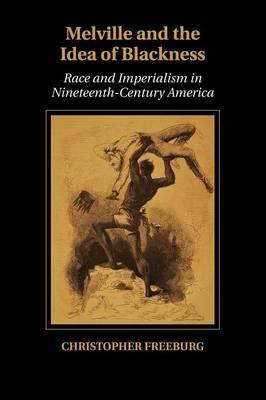Overview
By examining the unique problems that 'blackness' signifies in Moby-Dick, Pierre, 'Benito Cereno' and 'The Encantadas', Christopher Freeburg analyzes how Herman Melville grapples with the social realities of racial difference in nineteenth-century America. Where Melville's critics typically read blackness as either a metaphor for the haunting power of slavery or an allegory of moral evil, Freeburg asserts that blackness functions as the site where Melville correlates the sociopolitical challenges of transatlantic slavery and US colonial expansion with philosophical concerns about mastery. By focusing on Melville's iconic interracial encounters, Freeburg reveals the important role blackness plays in Melville's portrayal of characters' arduous attempts to seize their own destiny, amass scientific knowledge and perfect themselves. A valuable resource for scholars and graduate students in American literature, this text will also appeal to those working in American, African American and postcolonial studies.
Full Product Details
Author: Christopher Freeburg (University of Illinois, Urbana-Champaign)
Publisher: Cambridge University Press
Imprint: Cambridge University Press
Volume: 164
Dimensions:
Width: 15.10cm
, Height: 1.40cm
, Length: 22.80cm
Weight: 0.340kg
ISBN: 9781107477834
ISBN 10: 1107477832
Pages: 214
Publication Date: 29 January 2015
Audience:
Professional and scholarly
,
Professional & Vocational
Format: Paperback
Publisher's Status: Active
Availability: Manufactured on demand

We will order this item for you from a manufactured on demand supplier.
Reviews
'Freeburg's insistence that Melville's representations of race are both historically concrete and philosophically abstract (beating on questions of ontology and epistemology) makes this book crucial for thinking about how Melville's writings address the complex relation between literature and history.' Hennig Cohen Prize Committee, The Melville Society
'Freeburg's insistence that Melville's representations of race are both historically concrete and philosophically abstract (beating on questions of ontology and epistemology) makes this book crucial for thinking about how Melville's writings address the complex relation between literature and history.' Hennig Cohen Prize Committee, The Melville Society The chief effect of reading Christopher Freeburg's Melville and the Idea of Blackness is to see many of one's most seemingly secure assumptions about race in Melville - what it means, where it is located, what its political payoff is - almost thoroughly upended. Arguing that for Melville blackness is not always racial, and wary of the critical tendency to see democratic hopefulness in Melville's representations of interracial encounters, Freeburg instead proposes that blackness in Melville more often than not signals an existential impasse. This is a significant book and a major intervention in Melville studies. William Gleason, Princeton University Christopher Freeburg analyzes Melville's preoccupation with how ideas about race are bound up with questions of cognition, mastery, and mortality. Freeburg resists the confinements of race to identity and, in his readings, intricately links history, philosophy, form, and imagination. Melville and the Idea of Blackness is an important contribution not only to Melville scholarship but also to debates about race, politics, and literature. Samuel Otter, University of California, Berkeley Melville and the Idea of Blackness is clearly written and powerfully argued. Freeburg extends the idea of 'blackness' to include existential doubts and paradigm limits, even as he insightfully addresses slavery and race in a wide range of Melville's works. Robert Levine, University of Maryland, College Park Freeburg's insistence that Melville's representations of race are both historically concrete and philosophically abstract (beating on questions of ontology and epistemology) makes this book crucial for thinking about how Melville's writings address the complex relation between literature and history. Hennig Cohen Prize Committee, The Melville Society
Author Information
Christopher Freeburg is Assistant Professor of English at the University of Illinois, Urbana. He received his PhD from the University of Chicago and his Master's from Stanford University. His work has appeared in journals such as American Literature and Modern Fiction Studies.




